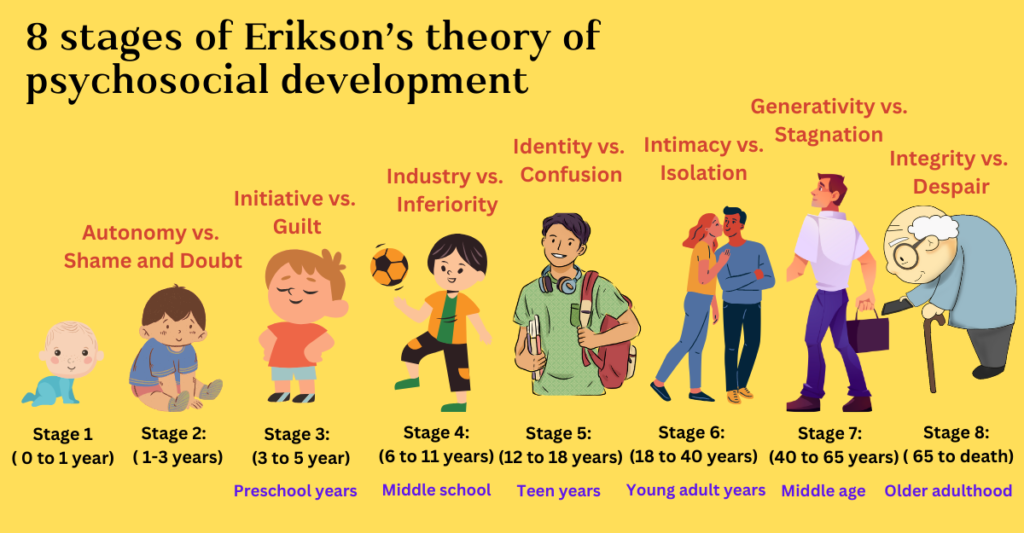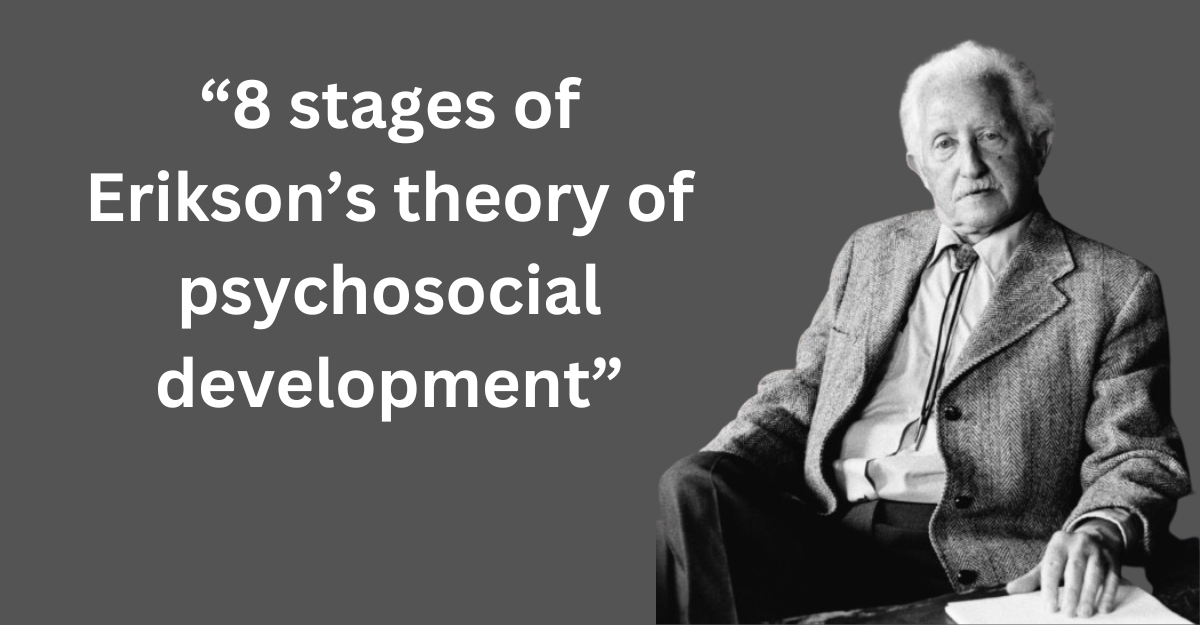In this article, we would like to study the main idea behind Erikson’s theory of psychosocial development, which proposes eight stages of human development. According to this theory, development continues in humans throughout their lives, and it’s divided into 8 stages. After understanding these eight stages, it will be easier for us to understand ourselves and the people around us. According to Erikson’s theory of psychosocial development, every person has to complete all eight stages of development for healthy growth and development in his life.

Contents
- 1 There are a total of 8 stages in Erikson’s theory of psychosocial development:
- 1.1 Stage 1( 0 to 1 year)
- 1.2 Stage 2: Autonomy vs. Shame and Doubt (Toddlerhood, 1-3 years)
- 1.3 Stage 3: Initiative vs. Guilt (Preschool years from three to five)
- 1.4 Stage 4: Industry vs. Inferiority (Middle school years from 6 to 11)
- 1.5 Stage 5: Identity vs. Confusion (Teen years from 12 to 18)
- 1.6 Stage 6: Intimacy vs. Isolation (Young adult years from 18 to 40)
- 1.7 Stage 7: Generativity vs. Stagnation (Middle age from 40 to 65)
- 1.8 Stage 8: Integrity vs. Despair (Older adulthood from 65 to death)
- 2 Conclusion
Stage 1( 0 to 1 year)
This is the stage of trust or mistrust. During this period, parents have to pay special attention to the needs of the child so that a feeling of trust can be generated in the child. A quick response to the child’s needs is needed to fulfill every need of the child, from eating, bathing to sleeping, which creates a feeling of trust in the child. During this period, we know that there is no speech development in the child, yet it is necessary to talk to the child from time to time. By doing this, the child feels connected.
It is often seen that the behavior of children who develop a feeling of mistrust is anxious and fearful. In the future, such children will not be able to maintain good relations with people in society.
Stage 2: Autonomy vs. Shame and Doubt (Toddlerhood, 1-3 years)
The main idea behind Erikson’s theory of psychosocial development stages is that a sense of self-identity arises. Children start taking their own decisions and taking risks. This stage is about gaining autonomy and authority over one’s environment. At this stage, children like to control their physical activities, like wearing their own clothes, playing independently, etc. Children in this stage are eager to learn new things, have less dependence on others, make friends with children of their own age, etc.
After the completion of this stage, if the child feels confident and self-assured about his abilities, it means that the child has completed this stage successfully. And if, after this stage, the child lacks self-confidence, it means that the child has failed to complete this stage. In such a situation, the child will feel ashamed and uncertain and will depend on others for decisions about his future.
Also Read 5 stages of Freud’s Psychosexual Theory in children
Stage 3: Initiative vs. Guilt (Preschool years from three to five)
This stage starts in children aged 3 years and is seen in children up to 5 years of age. Children at this stage want to do their work independently and get irritated by anyone’s interference. Children of this age develop the concept of setting aims and goals. If they are encouraged by parents or caregivers, they do their work enthusiastically, learn, and become discouraged when criticized.
Stage 4: Industry vs. Inferiority (Middle school years from 6 to 11)
In this stage, the main idea behind Erik Erikson’s theory of psychosocial development is that children develop a sense of independence, confidence, and capability. Children aged 5 to 11 go through the phase of primary education, and during this time, children should be encouraged to do new tasks so that they can evaluate their abilities. Always give positive feedback to children of this age and praise their achievements. Give them a chance to learn from their mistakes and improve on them.
Stage 5: Identity vs. Confusion (Teen years from 12 to 18)
The lives of children aged 12 to 18 years are challenging as the outcomes at this age affect various aspects of the rest of their lives. At this age, one may have to face uncertainty, confusion, and self-doubt. Children of this age should always be encouraged to take their own decisions, and their opinions and ideas should also be listened to and given importance. They should be provided with proper guidance and direction from time to time.
Stage 6: Intimacy vs. Isolation (Young adult years from 18 to 40)
In the initial phase of this stage, people are searching for personal relationships. At this stage, it is very important to form close and loving relationships that benefit them. There is a special need for public awareness on how to build healthy relationships. The young adult needs to feel that you listen to him and care about him. The main idea behind Erik Erikson’s theory of psychosocial development is awareness of how to build healthy relationships.
Also Read Pavlov’s Conditioning Theory | Pavlov’s experiment BEST MCQs 10
Stage 7: Generativity vs. Stagnation (Middle age from 40 to 65)
At a young age, people are often busy building their careers and do not get time for their personal lives. In the end, when they become successful, they feel that their life is going in the right direction, and when they fail, they feel immense guilt. So adults should try to create things that will last for a long time that can survive and provide them life security, such as having children, bringing some positive change in society, community or the world, doing something excellent in creative work like art, music, etc., or collaborating in research, etc. If adults fulfill these dimensions, then they feel satisfied in life.
Stage 8: Integrity vs. Despair (Older adulthood from 65 to death)
You may become satisfied or dissatisfied by remembering the events that happened in the past and the work and efforts you made. In this stage, people assess whether they are happy with whatever they have done in life or not. The review of life and the acceptance of death are the main aims of this stage. If they are happy with the work done in the past, then they feel that their life was meaningful. In this stage, the main idea behind Erik Erikson’s theory of psychosocial development is review of life and the acceptance of death.
Also Read KOHLBERG’S Theory of Moral Development Best 16
Conclusion
The eight stages of this theory express the reality of life and develop a deep understanding of human life. Human development and the complexity of his life can be evaluated through this theory. This theory has placed special emphasis on the fact that every human being has his own unique pace of development, and his development should not be compared with anyone else. Every person moves forward at his own pace and efforts, and in the end, self-happiness becomes most important.

